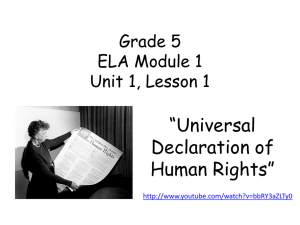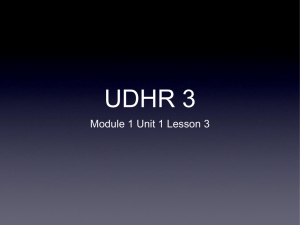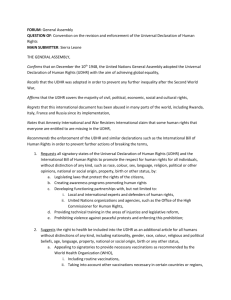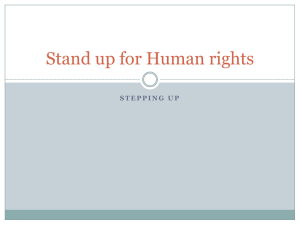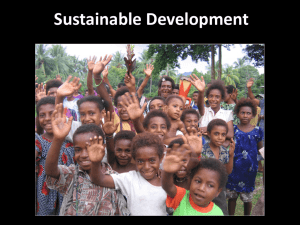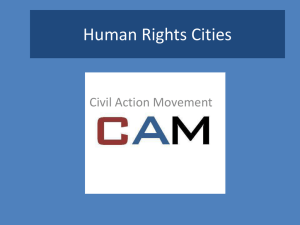The Rule in Rylands v Fletcher
advertisement
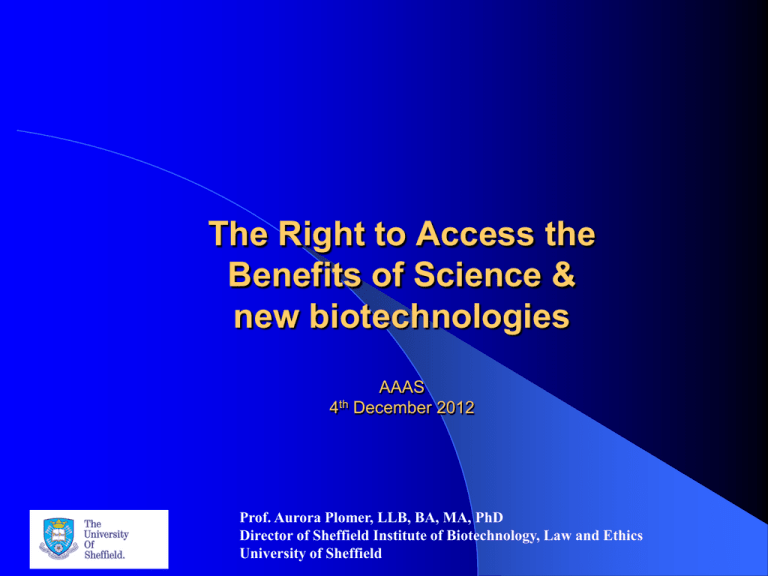
The Right to Access the Benefits of Science & new biotechnologies 4th AAAS December 2012 Prof. Aurora Plomer, LLB, BA, MA, PhD Director of Sheffield Institute of Biotechnology, Law and Ethics University of Sheffield Background Book: Human Rights, IP Rights & New Biotechnologies (Johns Hopkins University Press, forthcoming 2013) Spectacular advances in the life-sciences Extension of patents to isolated cells, genes and foundational/basic knowledge Human rights constraints on research in the biosciences (e.g. Venice Statement, 2009) Patents on life: European divisions Nature Volume: 480, Pages: 310–312 Date published: (15 December 2011) DOI: doi:10.1038/480310a UK hESC Patents – Before Brustle v Greenpeace A. Plomer, ‘Article 6(2)(c) of the Biotech Directive: Towards Systemic Legal Conflict’ in A. Plomer & P. Torremans (eds) Embryonic Stem Cell Patents: European Law and Ethics (OUP, 2009) EU Directives & CJEU rulings – Human Dignity: Hits/year Occurrence of 'Human Dignity' 12 10 8 6 4 2 0 1980 -2 1985 1990 1995 2000 Year 2005 2010 2015 Universal Declaration of Human Rights (1948) Article 27 • (1) Everyone has the right freely to participate in the cultural life of the community, to enjoy the arts and to share in scientific advancement and its benefits. • (2) Everyone has the right to the protection of the moral and material interests resulting from any scientific, literary or artistic production of which he is the author. Two central questions Apparent tension between public rights of access to science and private rights of authors/inventors in Art. 27 UDHR and Art. 15 ICESCR. Why? Do Art. 27 UDHR and Art. 15 ICESCR carry ethical restrictions or limits on scientific research in the life-sciences and if so which? Methodology Review drafting history of Art. 27 UDHR & Art. 15 ICESCR. Identify areas of overlapping consensus & core values Draw implications for emerging biotechnologies Why look back? “… the present declaration had been drafted on a firm international basis .... a compilation not only of hundreds of proposals made by governments and private persons but also of the laws and legal findings of all the Member States of the UN” Dr. Malik, delegate from Lebanon, speaking at the General Assembly (1948) UDHR Drafting Committee & Commission on Human Rights Drafting committee on the Universal Declaration of Human Rights had eight members representing a plurality of political and religious outlooks: Australia, Chile, China, France, Lebanon, the USSR, the UK, and the US. The members of the Commission included, in addition, members from, Belgium, Byelorussian Soviet Socialist Republic, Egypt, India, Iran, Lebanon, Panama, Philippine Republic, Uruguay, and Yugoslavia. Article 27 (II) Soviet Union proposal to add “The development of science must serve the interests of progress and democracy and the cause of international peace and co-operation” rejected as providing a basis for political interference with freedom required for scientific and artistic expression (3rd Session CHR, May-June 1948) Several unsuccessful attempts by South American and French delegations to introduce protection for “scientific and artistic pioneers (….) those who contributed to the advance of civilization were entitled to have their interests protected.” (Cassin, 25th August 1948) Turning point is 3rd Plenary meeting of General Assembly (20th of November 1948). Joint submission by France, Mexico, and Cuba to add a second paragraph to Article 25 (now Article 27) : “Everyone has, likewise, the right to the protection of his moral and material interests in any inventions or literary, scientific or artistic works of which he is the author.” Resisted by UK and US on grounds that clause relates to copyright/property rights (art 15). Confuses IP rights with human rights. Ecuador says it is the most confused text in the Declaration. But joint submission carries the day A/C.3/SR.150 - 150th Meeting, held on Saturday, 20 November 1948: 01/01/1948 UK/US Rights of authors are a species of legal right – (copyright/patents). IP rights are not universal Rationale for IP rights/patents is social/economic utility. "to talk of the natural rights of an inventor is to talk nonsense” Jeremy Bentham France & South American countries • Intellectual creations are a form of work/labour • Intellectual work is as worthy of recognition/remuneration as physical labour. • Intellectual works are fundamental to social and economic progress • “… the labor of his body and the work of his hands, we may say, are property his.” J. Locke In favour Argentina, Belgium, Brazil, China, Colombia, Cuba, Dominican Republic, France, Greece, Honduras, Luxembourg, Mexico, Netherlands, Panama, Peru, Poland, Uruguay, Venezuela. Against:, Australia, Canada, Chile, Denmark, Ecuador, India, Norway, Pakistan, Sweden, Syria, United Kingdom, United States of America, Yemen Abstentions: Saudi Arabia, Ukrainian Soviet Socialist Republic, Union of Soviet Socialist Republics, Yugoslavia, Afghanistan, Byelorussian. Cuba, France, Mexico: Joint Amendment to Article 25 of the Draft Declaration (E/800). International Covenant on Economic Social and Cultural Rights (1966) Article 15 1. The States Parties to the present Covenant recognize the right of everyone: • (a) To take part in cultural life; • (b) To enjoy the benefits of scientific progress and its applications; • (c) To benefit from the protection of the moral and material interests resulting from any scientific, literary or artistic production of which he is the author. 3. The States Parties to the present Covenant undertake to respect the freedom indispensable for scientific research and creative activity. 4. 4. The States Parties to the present Covenant recognize the benefits to be derived from the encouragement and development of international contacts and co-operation in the scientific and cultural fields. Overlapping Consensus • The right to access the benefits of scientific progress is directed to the protection of the universal human ability for selfexpression and creativity. Realization of the right requires: • - enabling educational institutions and infrastructures for diffusion, dissemination and transmission of knowledge, science and the arts. - freedom of expression and freedom from political and/or religious interference - enabling democratic institutions. • The right does not prescribe any particular form of legal protection. IP rights are NOT fundamental human rights. Universality & Interconnectedness of Human Rights Art. 2 Non-Discrimination Art. 26 Right to Education & full development of the human personality Art. 24 Rest and leisure Art. 3 Right to Life, Liberty & Security Art. 18 Right to Freedom of thought/conscience /religion Human Dignity The drafters of the UDHR did not think of human dignity as a separate right, but as a fundamental value reflected in and guiding each of the articles and discrete rights proclaimed in the UDHR (and subsequent covenants) A violation of each discrete right , i.e. non-discrimination, to health, education and to access the benefits of science is a violation of human dignity. Thank You
